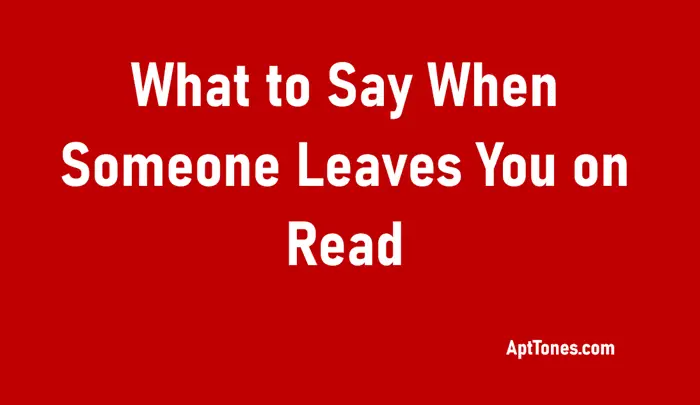Being left on read means someone has seen your message but hasn’t responded. It happens all the time in texting and messaging apps, and the silence can feel confusing or frustrating.
How you handle it depends on who the person is and what’s going on between you two. The goal is to respond in a way that’s respectful and clear without coming across as pushy or desperate.
Patience matters, but so does knowing when to follow up and when to let it go.

20 Things to Say When Someone Leaves You on Read
This article offers 20 ideas for what to say in such situations, each tailored to a different context and relationship dynamic.
1. Friendly Follow-Up
“Hey, I noticed you read my last message. Just wanted to make sure everything’s okay on your end. Let me know when you’re free to chat!”
This is a considerate and non-intrusive way to re-initiate conversation. It’s suitable when you’re not sure why your message was left on read and want to express concern without applying pressure.
2. Light-Hearted Nudge
“Seems like my last message might have gotten lost in the digital world! Just bumping it up in your inbox. ”
Use this when the conversation is casual, and you want to remind them of your message playfully. It’s ideal for keeping the tone light and friendly.
3. Direct Approach
“I noticed you read my message. Is everything okay? Your response would really help me understand the situation better.”
This response is straightforward and is best used when clarity is needed in a conversation, especially in situations where the response is important to you.
4. Offering an Out
“If now’s not a good time to talk or if something’s come up, I completely understand. Just let me know when you’re available.”
This is respectful and gives the other person space, indicating your understanding that they might be busy or not in the mood to chat.
5. Humorous Tone
“Hello from the other side of the read receipt! Hope all is well. Let me know when you escape the busyness of life!”
Appropriate for friends and close acquaintances, this response injects humor to lighten the situation, making it easier for them to re-engage in the conversation.
6. Checking In
“Just checking in as I saw you read my last message. Hope you’re doing okay. Let me know if you need to talk about anything!”
Use this when you are concerned about the person’s wellbeing. It shows care and willingness to offer support.
7. Respectful Reminder
“I understand you might be tied up, but I’d really appreciate your thoughts on my last message when you have a moment.”
This is ideal when waiting for a response on an important matter. It’s a polite reminder that acknowledges their potential busyness.
8. Casual Check
“Hey! Saw you read my message. No rush, but hit me back when you can. Hope all’s well!”
Best for casual conversations where the reply isn’t urgent. It’s friendly and non-demanding.
9. Expressing Concern
“I noticed you’ve read my message but haven’t replied. Just want to make sure everything is okay with you. I’m here if you need to talk.”
This is suitable when you’re genuinely worried about the person, especially if it’s unusual for them not to reply.
10. Offering Flexibility
“In case you’re swamped right now, I’m okay to wait for your response. Just wanted to let you know there’s no pressure.”
Use this to show understanding and patience, especially in professional or formal contexts where the other party might be busy.
11. Clear Communication
“I saw that you read my message. If you’re unsure how to respond, it’s alright. I’m open to discussing it further if needed.”
Appropriate when you sense hesitation or uncertainty in the other person. It encourages open communication.
12. Friendly Tease
“Caught you reading and not replying! Whenever you’re ready to emerge from the land of no replies, I’m here!”
This is playful and suitable for close relationships where you can tease each other without misunderstanding.
13. Giving Space
“I see you’ve read my message. I’ll assume you need some time to think or you’re busy. No worries, reply when it’s convenient for you.”
Ideal for situations where you want to give the person space without making them feel rushed to respond.
14. Reiterating Importance
“My last message is quite important for [reason]. I’d appreciate it if you could take a moment to respond when possible.”
Use this when the message is of significant importance and requires a response, making sure to communicate the urgency politely.